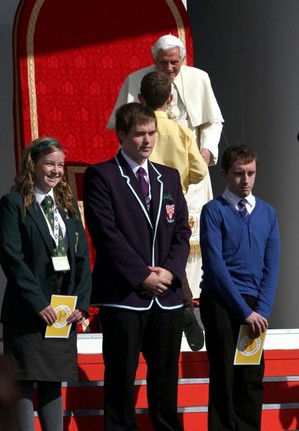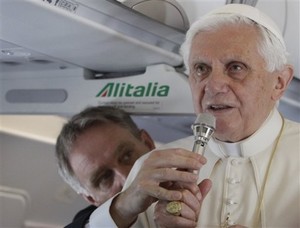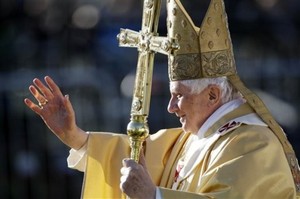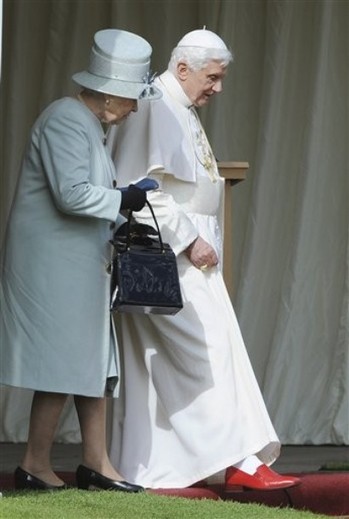We are all pilgrims; we are all called to seek the face of God; we are all called to follow the Divine Other; we are called to dine richly on the divine gift of the Eucharist, the Food for the journey (viaticum) and to rest on the heart of Christ. I remember my religious superiors telling me that in making a pilgrimage Saint Ignatius of Loyola laid more emphasis on what happened to one's heart during the pilgrimage than merely getting to the destination. While getting to a holy place is important it ranks second to the conversion of heart that is hoped for during the pilgrimage experiment. How true. It wouldn't matter if you got to Santiago de Compostella or not if your heart wasn't radically changed according to the mind of Christ. My dream is to make the pilgrimage to the great shrine of Saint James, the place of the Lord's friend; I pray for the grace that my heart be turned inside-out. In the meanwhile, I'll make the road to the confessional my walk in the Way of Christ. The pope sets the stage for a pilgrimage spot is and how we Catholics are to be as welcoming as Christ is to the pilgrim. Read a portion of the Pope letter to the bishop and people of Compostella:

With great pleasure I would like to express my spiritual closeness to the congress participants to encourage and accompany them in carrying out a pastoral task of such great importance in ecclesial life. I will personally make a pilgrimage soon to the tomb of the Apostle Saint James, the "Lord's friend", in the same way that I have made my way to other places in the world which many of the faithful visit with fervent devotion. In this regard, from the beginning of my pontificate, I have wanted to live my ministry as the Successor of Peter with the sentiments of a pilgrim who travels over the roads of the world with hope and simplicity bringing on his lips and in his heart the saving message of the Risen Christ, and strengthening his brothers in faith (cf. Lk 22:32). As an explicit sign of this mission, my coat-of-arms includes the pilgrim's shell, among other elements.
In these historic moments in which we are called, with greater force if possible, to evangelize our world, the riches offered to us by the pilgrimage to shrines should be highlighted. First of all, for its great ability to summon and bring together a growing number of pilgrims and religious tourists, some of whom are in complicated human and spiritual situations, somewhat distant from living the faith and with a weak ecclesial affiliation. Christ speaks to all of them with love and hope. The desire for happiness that is imbedded in the soul finds its answer in Him, and human suffering together with Him has a meaning. With his grace, the noblest causes also find their complete fulfillment. As Simeon met with Christ in the temple (cf. Lk 2:25-35), so too a pilgrim should have the opportunity to discover the Lord in the shrine.
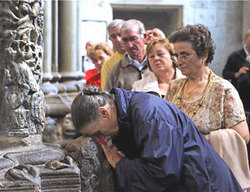
For this purpose, efforts should be made so that visitors may not forget that shrines are sacred places in order to be in them with devotion, respect and propriety. In this way, the Word of Christ, the Son of the living God, can ring out clearly, and the event of his death and resurrection, the foundation of our faith, can be proclaimed completely. Very careful attention should also be given to welcoming the pilgrims, by highlighting, among other elements, the dignity and beauty of the shrine, the image of "God's dwelling... with the human race" (Rev 21:3), the moments and spaces for both personal and community prayer, and attention to devotional practices. In the same way, it can never be stressed enough that shrines should be lighthouses of charity, with unceasing dedication to the neediest through concrete works of solidarity and mercy, and constant readiness to listen, favoring in particular the faithful's reception of the Sacrament of Reconciliation and taking part worthily in the Eucharistic celebration, making this the center and apex of all the pastoral activity of the shrines. In this way it will be made manifest that the Eucharist is indeed the pilgrim's nourishment, the "Sacrament of the God who does not leave us alone on the journey but stays at our side and shows us the way" (Homily on the Solemnity of Corpus Christi, May 22, 2008).
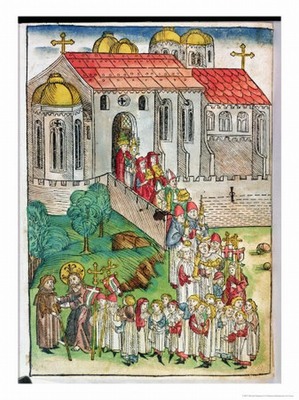
In fact, different from a wanderer whose steps have no established final destination, a pilgrim always has a destination, even if at times he is not explicitly aware of it. And this destination is none other than the encounter with God through Christ in whom all our aspirations find their response. For this reason, the celebration of the Eucharist can really be considered the culmination of the pilgrimage.
As "God's co-workers" (1 Co 3:9), I exhort all of you to be dedicated to this beautiful mission so that through your pastoral care, you will favor in pilgrims the knowledge and imitation of Christ who continues to walk with us, enlighten our lives with his Word, and share with us the Bread of Life in the Eucharist. In this way, the pilgrimage to the shrine will be a favorable occasion to strengthen the desire in those who visit it to share the wonderful experience with others of knowing they are loved by God and sent to the world to give witness to that love.
The Vatican, September 8, 2010Benedictus PP. XVI


